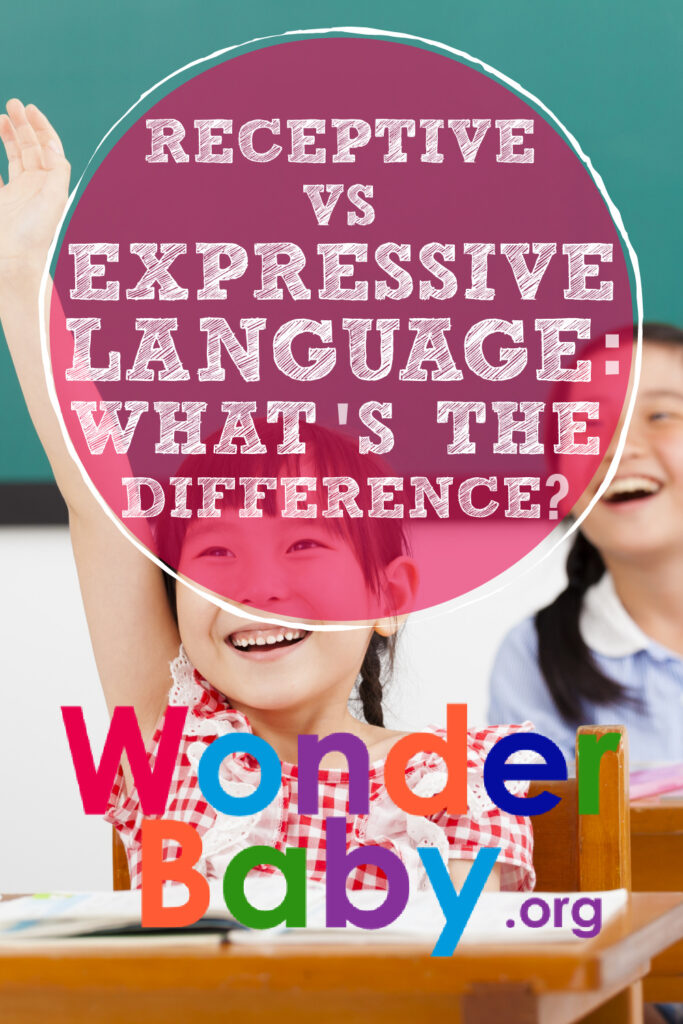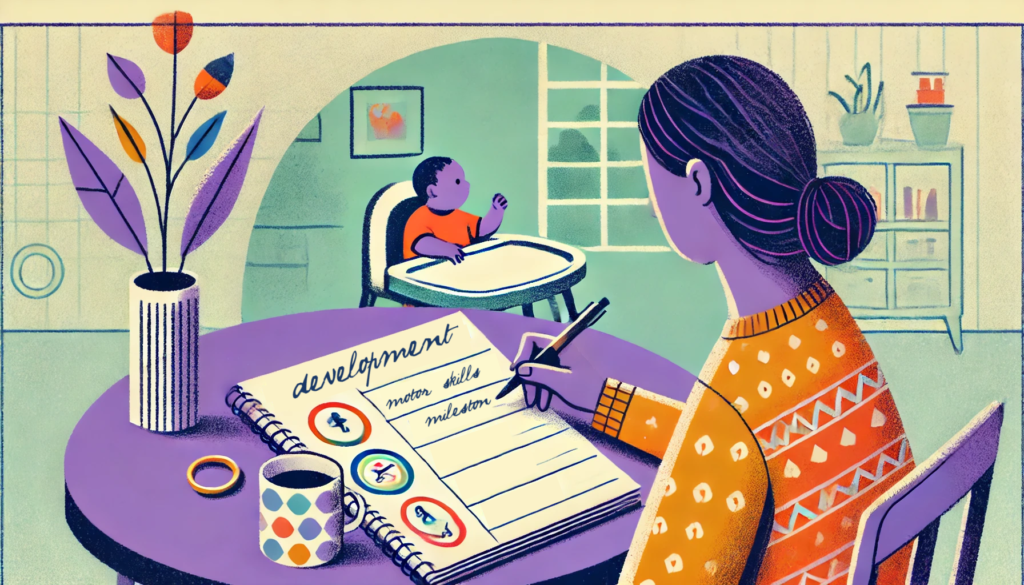Receptive vs Expressive Language: What’s the Difference?

- Receptive language refers to our ability to understand information.
- Expressive language refers to our ability to express language.
- Both receptive and expressive language are important pieces to language development.
I’ll never forget the first time I heard my child say “mama.” Such a sweet, simple word can invoke so many emotions. It’s a word that communicates, “I know you.”
Our words are more than just expressions of needs and wants. They are a complex system of ideas, thoughts, emotions, and more. When a child communicates with others, they interact with this complex system.
Many of us think of language as one large category. However, language combines two separate skills—expressive and receptive language skills. Both skills are necessary to communicate successfully.
One or both of these skills are affected when a child has a language disorder. Knowing the difference between the two will help you determine what type of speech therapy your child might need. Often, language and oral motor skills make significant improvement with early intervention.
If you’re concerned about your child’s ability to communicate, understanding the difference between receptive and expressive language can help. With some helpful tips, you’ll feel confident and able to help your little one communicate successfully.
What is Receptive Language?
Receptive language refers to our ability to understand information. Think of it as the information you receive.
You use receptive language skills when you talk on the phone with a friend. Though you aren’t aware of it, your brain is busy making sense of the information you’re hearing from the other side. Receptive language skills also apply to making sense of shapes, colors, gestures, sounds, and other types of information we receive.
Here are some other examples of receptive language:
- Listening to a story
- Listening to directions
- Hearing your name
- Listening to questions
- Hearing new vocabulary
How are receptive language skills developed?
Receptive language skills develop through daily routines and interaction with the world around us. Think of how babies respond to new sounds or turn when they hear their mother’s voice. Receptive language skills are a part of normal child development and often form without parents realizing it.
Many children develop and sharpen their receptive language skills through the many stages of play. As they work towards cooperative play, they gather the skills needed to understand and communicate with their peers.

Importance of Receptive Language Skills in Child Development
For your child to comprehend language, they will need a solid grasp of receptive language skills. If your child doesn’t comprehend the words spoken to them, they’ll likely end up frustrated or feeling isolated. If you understand what skills your child needs to develop to overcome receptive language challenges, you can help them advance.
What are some examples of receptive language skills?
- Following directions
- Understanding new vocabulary words
- Comprehending a story after it is read
- Understanding questions
- Responding to familiar sounds and language
Why are receptive language skills important in child development?
Receptive language skills are an important part of child development because they enable a child to understand spoken language and interact with their family, peers, and others. This helps them develop a sense of independence and confidence. Children with receptive language difficulties might find completing academic tasks difficult.
Also, severe receptive language difficulties might affect the way a child expresses language.
A 2007 study published in the Archives of Disease in Childhood, conducted by Ann Clark, Anne O’Hare, Jocelynne Watson, Wendy Cohen, Hilary Cowie, Rob Elton, Jamal Nasir, and Jonathan Seckl, titled “Severe receptive language disorder in childhood—familial aspects and long‐term outcomes,” found a strong connection between severe receptive language disorder and expressive language disorders.
They noted, “Severe receptive SLI is nearly always associated with an equally severe reduction in expressive language skills.”
What is Expressive Language?
Expressive language refers to our ability to express language. Think of this as the information we express to communicate with others.
We use expressive communication when we retell a story to a friend. While our mouths are moving, our brains are busy recalling information and forming sentences, using our knowledge of vocabulary, correct grammar, and more. Expressive language involves communication through both verbal and nonverbal communication.
Here are some other examples of expressive communication:
- Signing or using hand gestures
- Asking questions
- Making facial expressions
- Forming words
- Forming sentences
- Communicating ideas
How are expressive language skills developed?
Expressive communication skills are formed by a child’s interaction with those around them. From birth, a child is taking in the information heard around them. With this information, they begin to practice sounds and mimic expressions and movements.
Babies often learn their first words somewhere around 12 months of age. Their expressive language skills continue to develop rapidly through childhood as they start communicating with others. This leads to the development of reciprocal conversation skills.

Importance of Expressive Language Skills in Child Development
For your child to express their needs, feelings, wants, and more, they’ll need expressive language skills. Without these skills, your child might become frustrated and act out. Poor expressive communication will also affect writing skills and social skills in school.
What are some examples of expressive skills?
- Using signs and gestures to communicate effectively
- Forming questions and statements
- Using facial expressions to express feelings
- Using new vocabulary words
- Accurately naming objects and people
Why are expressive language skills important in child development?
Expressive communication skills are an important part of child development because they enable a child to express their thoughts. A child with an expressive language disorder is likely to feel misunderstood or isolated. Intervention by a speech therapist is crucial for long-term success.
Also, children with poor expressive language skills might need help with comprehension.
A 2019 study published in the Journal of Neurodevelopmental Disorders, conducted by Stephanie N. Del Tufo, F. Sayako Earle & Laurie E. Cutting, and titled, “The impact of expressive language development and the left inferior longitudinal fasciculus on listening and reading comprehension,” found a correlation between late expressive language development and comprehension.
They found that “When comprehension text features were examined, children with later milestones had poorer listening and reading comprehension, and poorer narrative and expository comprehension.”
Receptive Language vs Expressive Language
Both receptive and expressive language are important pieces to language development. Use this helpful chart to easily distinguish between receptive and expressive language:
| Expressive Language | Receptive Language |
| Responding to questions | Understanding questions |
| Pointing to or identifying objects | Looking at objects when named |
| Forming sentences and words | Understanding sentences and words |
| Giving directions | Following directions |
Activities to Improve Receptive Language Skills
You might consider finding a speech-language pathologist to support and improve your child’s receptive language skills. They will be able to determine if your child needs speech therapy and what skills need the most attention. They’ll also be able to diagnose a receptive language disorder.
However, there are also plenty of activities you can begin at home until you’re able to get a complete evaluation. Try these activities to help your child overcome receptive language difficulties:
- Play a listen-and-follow game like “Simon Says.”
- Read picture books.
- Speak in simple sentences.
- Provide visual aids and clues as you speak.
- Play with toddler puzzles and name the pieces.
- Have your child hunt for objects around the house that you call out.
Activities to Improve Expressive Language Skills
In order to accurately diagnose an expressive language disorder, an evaluation from a speech therapist is necessary. However, you can try these activities to help your child in the meantime:
- Play guessing games.
- Read picture books and have your child name the objects in the pictures.
- Sing songs and pause while waiting for your child to fill in the word.
- Ask your child who, what, when, where, and why questions.
- Play storytelling games.

Related Posts

Development, Special Needs
How to Track Milestones for Developmentally Delayed Babies
Parents of developmentally delayed babies can explore practical tools and strategies to track milestones, celebrate progress, and support their child’s unique developmental journey.

Fine and Gross Motor
5 Alternatives to Tummy Time for Babies with Motor Development Challenges
Does your baby struggle with tummy time due to motor development challenges? These alternatives to tummy time will offer the same benefits.

Development
Should Twins Share a Room?
Wondering if your twins should share a room? We’ll explore the pros and cons of room-sharing for twins right here before you make your decision.